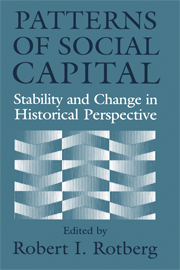Book contents
- Frontmatter
- Contents
- Introduction Social Capital and Political Culture in Africa, America, Australasia, and Europe
- Articles
- Civic Traditions in Premodern Italy
- The Sources of Civil Society in Italy
- Finding Social Capital: The French Revolution in Italy
- Social Capital in the Early Industrial Revolution
- The Diversity of Social Capital in English Communities, 1300–1640 (with a Glance at Modern Nigeria)
- Social and Cultural Capital in Colonial British America: A Case Study
- The Growth of Voluntary Associations in America, 1840–1940
- Civil Society as Democratic Practice: North American Cities during the Nineteenth Century
- Securing Political Returns to Social Capital: Women's Associations in the United States, 1880s–1920s
- Second-Generation Civic America: Education, Citizenship, and the Children of Immigrants
- Human Capital and Social Capital: The Rise of Secondary Schooling in America, 1910–1940
- From Local to National Political Cultures: Social Capital and Civic Organization in the Great Plains
Social and Cultural Capital in Colonial British America: A Case Study
Published online by Cambridge University Press: 12 April 2010
- Frontmatter
- Contents
- Introduction Social Capital and Political Culture in Africa, America, Australasia, and Europe
- Articles
- Civic Traditions in Premodern Italy
- The Sources of Civil Society in Italy
- Finding Social Capital: The French Revolution in Italy
- Social Capital in the Early Industrial Revolution
- The Diversity of Social Capital in English Communities, 1300–1640 (with a Glance at Modern Nigeria)
- Social and Cultural Capital in Colonial British America: A Case Study
- The Growth of Voluntary Associations in America, 1840–1940
- Civil Society as Democratic Practice: North American Cities during the Nineteenth Century
- Securing Political Returns to Social Capital: Women's Associations in the United States, 1880s–1920s
- Second-Generation Civic America: Education, Citizenship, and the Children of Immigrants
- Human Capital and Social Capital: The Rise of Secondary Schooling in America, 1910–1940
- From Local to National Political Cultures: Social Capital and Civic Organization in the Great Plains
Summary
Social capital is a relatively new concept that political scientists and sociologists have developed to distinguish certain social resources from others, namely, financial or investment capital, physical capital in the form of fixed or movable material resources, and human capital in the form of individual knowledge and technical skills. As employed by modern social scientists, such as Putnam, social capital consists of the organizations and connections that foster cooperation, trust, participation, the exchange of information, civil interaction, and coordinated activity in pursuit of social goals. An expression of the traditional social science concern with outcomes, the concept has proven useful to explain or predict the emergence of civil society, the development and growth of market economics, and the achievement of political democracy.
Whether the concept can be equally useful to historians remains to be seen. Far less concerned with how to attain the specific goals that modern society deems desirable, historians are principally interested in understanding and characterizing the myriad processes and dynamics that have made societies of all different shapes and sizes work in particular places at specific times. For their purposes, the present social science definition is too narrow, too instrumental, too whiggish, and too Western. To become a useful tool of analysis for historians, the concept must be rendered applicable to a wide variety of contexts over time and space.
- Type
- Chapter
- Information
- Patterns of Social CapitalStability and Change in Historical Perspective, pp. 153 - 172Publisher: Cambridge University PressPrint publication year: 2000
- 3
- Cited by



